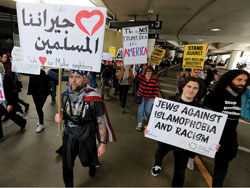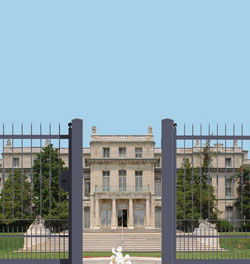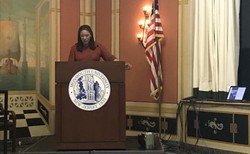University President Paul R. Brown Ph.D. released a statement to students and faculty on Jan. 30 in response to President Donald Trump’s travel ban. According to Brown, the University is committed towards maintaining a climate of inclusiveness despite the exclusive nature of the ban.
“In this period of immigration uncertainty, by far my biggest concern is the support and safety of our community members. Monmouth University will do everything possible within the limits of the law to protect those who will be affected by this order and to support our current students, faculty and staff regarding their immigration concerns,” said Brown.
The ban was established through an executive order on Jan. 27. It suspended the entire U.S. refugee admissions system for 120 days, Syrian refugees indefinitely, and banned entry from seven majority-Muslim countries – Iran, Iraq, Libya, Somalia, Sudan, Syria and Yemen – for 90 days following the signing of the order.
The ban has affected the travel of international students and professors at universities across the nation, including Monmouth. An Iranian student, who would like to remain anonymous given the current political situation, was unsettled when they saw their countries name on the list. “Trump is not like (former President Barack) Obama; nobody can forecast what he is going to do next,” they said. “The ban might end up being longer then he says. It is confusing, because I can’t plan my life. I don’t know if after I graduate school if any employers will want someone like me. They might have this bad impression about hiring someone who was on the ban list, so they might decide to hire somebody normal.”
Originally the ban included all visa holders, including permanent residents, but was updated by the White House to include green card holders. According to various news outlets such as the New York Times and the Boston Globe, the order has caused unending confusion for many foreigners trying to reach the United States, prompted protests across the United States, and led to multiple court challenges.
 “The full scope and legal ramifications of the Executive Order continue to evolve in the face of legal challenges,” said Brown. “While we continue to study the most appropriate recommendations for our students and faculty who may be impacted by the Order, please know that Monmouth University remains committed to our core values of integrity and diversity, characterized by cultural understanding and respect for others.”
“The full scope and legal ramifications of the Executive Order continue to evolve in the face of legal challenges,” said Brown. “While we continue to study the most appropriate recommendations for our students and faculty who may be impacted by the Order, please know that Monmouth University remains committed to our core values of integrity and diversity, characterized by cultural understanding and respect for others.”
The legality of the ban was tested this weekend in a lawsuit that reached the United States Court of Appeals for the Ninth Circuit in San Francisco late Saturday. Lawyers for the federal government asked the appeals court to retracta temporary restraining order on the banissued Friday by Judge James Robart of the Federal District Court in Seattle. The Ninth U.S. Circuit Court of Appeals denied the administration’s request to set aside the Seattle judge’s ruling that put a temporary hold on the ban nationwide. If appealed the case may be brought to the Supreme Court.
Not only was the Iranian student affected but his/her family was as well. He/she commented, “When we found out about the ban my family was pretty sad, because my sister was supposed to go the university next semester, but they canceled her interview at the embassy. They canceled all the interviews of Iranian people from all over the world.”
After the temporary halt of the ban, the State Department was able to reinstate 60,000 visas of previously banned travelers. Therefore, the Iranians students’ sibling may still become a Hawk in the near future.
According to Jon Stauff, Ph.D., Vice Provost for Global Education, the University will not deny a student admittance for being on the list. He said, “Monmouth University remains committed to its mission to prepare students ‘to become engaged citizens in a diverse and increasingly interdependent world.’…Students from the seven countries included in last week’s executive order will continue to have their applications processed as they were before the order was signed.”
“We need to remember that the current restrictions have been designed as temporary measures to be used only until the Trump Administration has reviewed pertinent regulatory practices…The university will continue to monitor the situation, but there are no plans to prevent students from any country from submitting an application to attend MU,” Stauff continued.
Rekha Datta Ph.D, a professor of political science, explained that similar bans have been in place before by other administrations. She said, that in the 1920’s, the ‘national origins system’ favored immigration from mostly Western European ones, and in 1965 the Immigration and Nationality Act banned immigration on the basis of national origin.
She said, “A 1952 law allows the president to issue temporary bans to protect national interest. President Carter issued a temporary ban on students and tourists during the Iran hostage crisis leaving open immigration on humanitarian grounds.”
Nicole Benis, a Monmouth Alum, agrees with the ban. “I can see why people would be against the ban. However, people need to see that this was done for the safety of Americans and not to discriminate against anyone. He wants to hold off on immigration from these countries that President Obama listed as area’s of concern, until he implements policies that he feels comfortable with.”
However, other students like Zareen Shueib, a senior accounting student and Vice President of the Muslim Student Association, are disappointed by the ban. “At first, it was hard to believe because America is always referred to as the country of immigrants where everyone is welcome. Then when it really hit, it felt awful; the rest of the world looks to see how we (Americans) are going to react to something and I think this time we have let down the people who really had hope from us,” she said.
Although the future of the ban is presently unclear, Brown asserts that diversity is a permanent part of the University’s framework. He said, “A cornerstone of our strategic plan is to foster opportunities for global and cultural literacy through our curriculum and programming. An important part of that commitment is embracing the diversity of cultures, languages, ethnicities, and faiths that form the Monmouth University community of students, scholars, and staff.”
“We will continue to keep the community apprised of further federal actions that impact our students, faculty, and staff,” said Brown.
IMAGE COMPLIED by Jamilah McMillan




